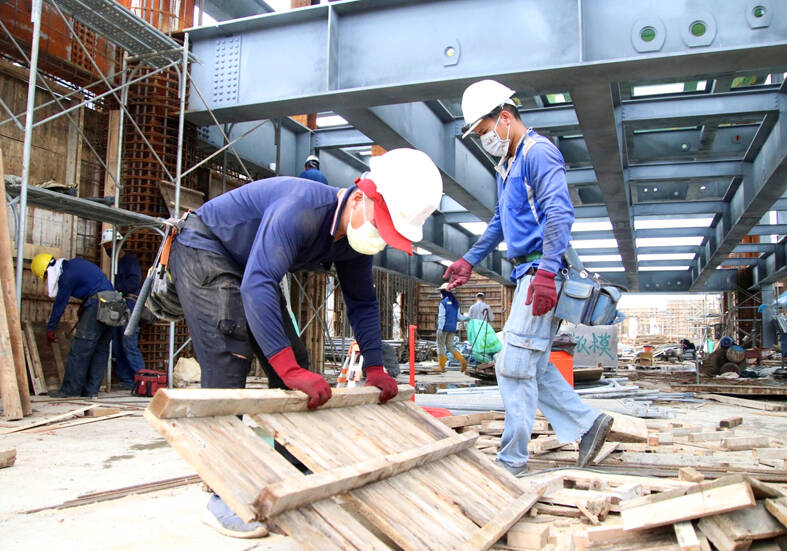Taiwan’s manufacturing output last quarter shrank 9.44 percent from a year earlier to NT$4.54 trillion (US$142.52 billion) due to tepid end-market demand for tech and non-tech products and lingering inventory adjustments, the Ministry of Economic Affairs said in a report released yesterday.
Output was down for a fourth consecutive quarter, dragged also by firms’ lack of interest in capital spending in the face of a business slowdown, the report said.
Industrial production fell by a steeper 11.43 percent to 87.69, marking the fifth straight quarter of decline, as all major sectors took a hit from global inflation and restrictive monetary policy, it said.

Photo: CNA
Electronic component manufacturers reported an industrial output of NT$1.38 trillion, declining 11.95 percent year-on-year, as demand for chips softened and clients digested inventories, limiting business for local suppliers of chips, printed circuit boards and Ajinomoto build-up film, or ABF, substrates, it said.
Flat panels bucked the downtrend by posting a 28.05 percent gain to NT$146.8 billion, thanks to restocking demand for large-screen TVs, it said.
Industrial production for computers and optical devices picked up 17.05 percent to a new high of NT$369.5 billion, driven by strong demand for data centers, cloud solutions and artificial intelligence (AI) applications, it said, adding that servers were a main beneficiary.
Suppliers of non-tech products fared weaker, as industrial output at firms making chemical materials and fertilizers slumped 16.64 percent, base metals fell 14.75 percent and machinery equipment contracted 14.51 percent, it said.
As global trade slowed, companies turned conservative on purchases of machinery equipment and input materials, it said.
Chips and parts used in vehicles held steady, with industrial output edging up 1.97 percent to NT$127.9 billion, as major players stimulated sales through active promotions and new model launches, it said.
Taiwanese manufacturers might come out of the woods with the release of new-generation technology products and peak sales season in China and the West, the ministry said.
Several tech firms earlier gave a positive business guidance for this quarter and beyond ahead of China’s Singles’ Day shopping festival this month and the upcoming holiday season in the West.
Booming demand from high-performance computing, AI and electric vehicles would continue to benefit local suppliers, the ministry said.
However, companies need to need to remain alert amid rising geopolitical tensions, technology competition between the US and China and the unfavorable impact of previous rate hikes, it said.

PATENTS: MediaTek Inc said it would not comment on ongoing legal cases, but does not expect the legal action by Huawei to affect its business operations Smartphone integrated chips designer MediaTek Inc (聯發科) on Friday said that a lawsuit filed by Chinese smartphone brand Huawei Technologies Co (華為) over alleged patent infringements would have little impact on its operations. In an announcement posted on the Taiwan Stock Exchange, MediaTek said that it would not comment on an ongoing legal case. However, the company said that Huawei’s legal action would have little impact on its operations. MediaTek’s statement came after China-based PRIP Research said on Thursday that Huawei filed a lawsuit with a Chinese district court claiming that MediaTek infringed on its patents. The infringement mentioned in the lawsuit likely involved

Taipei is today suspending work, classes and its US$2.4 trillion stock market as Typhoon Gaemi approaches Taiwan with strong winds and heavy rain. The nation is not conducting securities, currency or fixed income trading, statements from its stock and currency exchanges said. Authorities had yesterday issued a warning that the storm could affect people on land and canceled some ship crossings and domestic flights. Taiwan Semiconductor Manufacturing Co (TSMC, 台積電) expects its local chipmaking fabs to maintain normal production, the company said in an e-mailed statement. The main chipmaker for Apple Inc and Nvidia Corp said it has activated routine typhoon alert

GROWTH: TSMC increased its projected revenue growth for this year to more than 25 percent, citing stronger-than-expected demand for AI devices and smartphones The Taiwan Institute of Economic Research (TIER, 台灣經濟研究院) yesterday raised its forecast for Taiwan’s GDP growth this year from 3.29 percent to 3.85 percent, as exports and private investment recovered faster than it predicted three months ago. The Taipei-based think tank also expects that Taiwan would see a 8.19 percent increase in exports this year, better than the 7.55 percent it projected in April, as US technology giants spent more money on artificial intelligence (AI) infrastructure and development. “There will be more AI servers going forward, but it remains to be seen if the momentum would extend to personal computers, smartphones and

Catastrophic computer outages caused by a software update from one company have once again exposed the dangers of global technological dependence on a handful of players, experts said on Friday. A flawed update sent out by the little-known security firm CrowdStrike Holdings Inc brought airlines, TV stations and myriad other aspects of daily life to a standstill. The outages affected companies or individuals that use CrowdStrike on the Microsoft Inc’s Windows platform. When they applied the update, the incompatible software crashed computers into a frozen state known as the “blue screen of death.” “Today CrowdStrike has become a household name, but not in